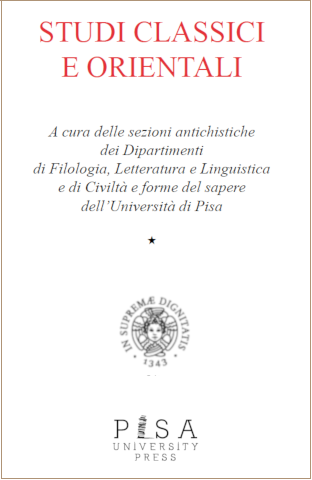Aristoteles-Viten und -Schriftenkataloge. Die Aristoteles-Schrift des Ptolemaios im Licht der Überlieferung
Abstract
Aristoteles’ biographies and catalogues of writings. Ptolemaios’ treatise in the light of tradition.
In the 40s of the last century, scholars discovered a manuscript in Istanbul
(Ms Ayasofya 4833) containing the Arabic translation of a treatise
on Aristotle by an otherwise unknown Ptolemaios; the Greek origina is lost. This treatise comprises an introduction, a vita of Aristotle, his
will and a catalogue of his writings. Before this discovery Ptolemaios’
work was mainly known via excerpts by Arab compilators. It is also
mentioned by the 6th century neo-Platonist commentator David (Elias),
and in two vitae of Aristotle by the neo-Platonist school. The identity
and chronology of Ptolemaios are still open questions. This article
tries to shed light on them, analysing Ptolemaios’ treatise and placing it
within the context of other Greek and Arabic sources, i.e. the different
Aristoteles-vitae and the ancient lists of his writings. As Ptolemaios’
catalogue differs considerably from the other two extant ancient lists,
the treatise is particularly important for our knowledge of the tradition
of Aristotle’s writings.
In order to gain an insight into the way in which this tradition formed, we
have to understand the fate of Aristotle’s (and Theophrastos’) personal
library. Greek sources report that for several centuries the library lay hidden
in Skepsis (Asia Minor) before re-emerging in Athens in the course
of the 1st century B.C. The books are said to have been brought later to
Rome, where copies were made which – probably in the second half of
the same century – were used by Andronikos of Rhodos for his Pinakes
of the works of Aristotle and Theophrastos. Ptolemaios’ catalogue and
the introduction to his treatise prove that he was familiar with Andronikos.
Andronikos’ Pinakes are lost, so it is tempting to assume that Ptolemaios
used them and that Ptolemaios’ treatise allows us to reconstruct
them. The article discusses the relationship between Ptolemaios and Andronikos
and shows all the problems of such a reconstruction.
gertrud.mager@arts.kuleuven.be


